
Kichijoji's Harmonica Alley
AnonymousRestaurants, bars, fortune tellers, and more than enough photo ops at Kichijoji's Harmonica Alley.

Harmonica Allee is located in the trendy area of Kichijoji and is a section of local izakaya bars that are only a few minutes' walk from the train station. The alleys of Harmonica Allee are narrow and at the same time full of life. There you can find fashion, local market traders, which are open during the day, as well as izakayas and pubs that can be visited until late at night.
Since the 1990s, Harmonica Allee has been very popular, especially among the locals, for its stand-up bars with inexpensive snacks in the late evening. The area was named for the way this tight tangle of restaurants, shops, and bars resembles a harmonica.
It can get full quickly, but it definitely never gets uncomfortable!
5-minute walk from JR Kichijoji station

Restaurants, bars, fortune tellers, and more than enough photo ops at Kichijoji's Harmonica Alley.
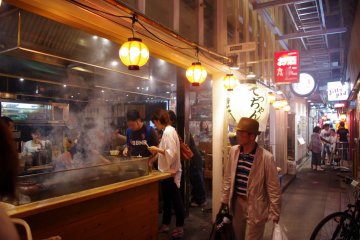
Located on the western edge of central Tokyo, Musashino City is home to Kichijoji, one of Tokyo's most desirable areas to live. Fantastic local nightlife and shopping at Harmonica Alley and Sunroad Shotengai, the city also features numerous local shrines and citizen art.
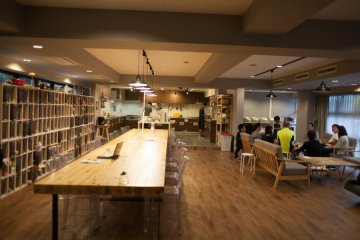
Oakhouse Social Residence Koganei in Tokyo's Koganei suburb is a share house that offers long-term residence to both Japanese and international residents.

With Koenji being a "creative town" it's no surprise that the BnA Hotel opened there in 2016 and has had, subsequently, an incredible impact on the local community. BnA (Bed and Art) has other spaces dotted about Tokyo and Kyoto, but the Koenji edition is possibly more immersive as the concept is "stay in an artwork." In collaboration with local artists, the BnA has created an impressive multi-storey art experiment for art lovers and creatives with a desire to inhabit art. The first floor acts as a front desk and bar which comes alive at night with events and selected DJs. It also hosts Masu Masu onigiri cafe with artists being asked to come and exchange artwork with each other in a gesture which reflects the true spirit of Koenji. With two "living art" twin rooms taking up the second and third floors designed by a seasonal rotation of local artists, guests can engage with and inhabit their art rooms. BnA Koenji also plays host to a rooftop lounge and a basement space which is used for artists residencies where their work is shown to the public and a DJ booth and streaming equipment for live performances. With live painting events and an eclectic variety of regular events, the BnA Hotel becomes, itself, a living canvas. The BnA believes that it's a machigata hotel, meaning that guests should (and are encouraged) to interact with Koenji. Use the public sentos, eat in the local restaurants that surround the hotel and buy locally from the multitude of shops, market stalls, bars and cafes which make-up the fabric of Koenji. Feted by international press such as The Guardian, BnA acts as a creative network with the concept of serendipity being discussed as the bar becomes an ad hoc meeting place where collaborations and friendships between artists and locals are born. The BnA was also instrumental in a street art festival named MCP (Mural City Project) which was supported by Suginami Ward. MCP was incredibly ambitious and truly communal with the desire to transform and coalesce the community through the creation of public murals. The BnA, Koenji and Suginami spearheaded a public art movement which should be commended and replicated throughout Tokyo.
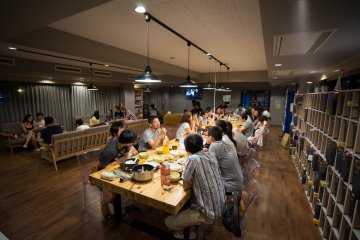
A very nice and comfortable share house with a tight and friendly community.
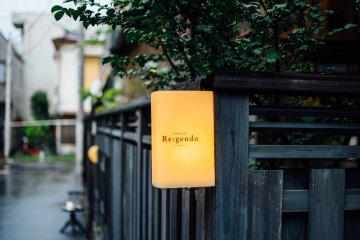
Re:gendo is a cafe, apparel and arts and crafts store found in the quaint backstreets of Nishi-Ogikubo, just a few minutes from the station. It embodies everything about Shimane prefecture, capturing the essence of its history, culture and beauty that help inspire everything on offer here. Located in a spectacular wooden structure, which is said to be around 90 years old, Re:gendo is an homage to Shimane and the staff and owners take great care to display the cultural history of their beloved homeland. It’s a curious space, layed out over two floors. It acts as a thriving restaurant, apparel store, arts and crafts shop and a workshop space which focuses on teaching craftsmanship and culinary skills. The cafe recognizes the nuances involved in Shimane produce such as rice which it uses for its extremely popular, seasonal lunch menus musubi zen and nigiri zen. Musubi zen consists of a main fish or meat dish while nigiri showcases vegetable nigiri sushi. Both courses come with accompaniments including vegetables, pickles and miso soup. The ingredients at Re:gendo are sourced locally in Toyo or from Shimane. The cafe also does a fine collection of sweets (Shimane folk are particularly fond of wagashi or traditional Japanese confectionery). The apparel and crafts section, situated on the first floor adjacent to the cafe includes a range of arts and crafts from Shimane and a curated fashion line which uses a type of non-toxic dye from Shimane so it’s safer for pregnant women or customers with allergies. The second floor hosts regular workshops about local craftsmanship and cuisine. Visitors from all over the world come and participate in workshops and learn the intricacies involved in Shimane’s abundance of specialities. Re:gendo acts, then, as a local hub and a popular attraction for many of Tokyo’s Shimane transplants. Refined, cultured, respectful of ancient traditions and friendly, it should be considered an essential stop on any visit to Nishi-Ogikubo.
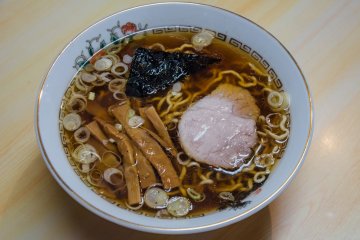
Ramen has become a global cuisine over the past decade with ramen-ya popping up in cities all over the globe. Millions of visitors, however, flock to Japan every year to experience the real deal. Harukiya, located a few minutes from JR Ogikubo Station, is a Tokyo institution. Established in 1949 it is the originator of Tokyo-style ramen which uses niboshi (dried baby sardines) in its broth and has been serving up first-class soy sauce which hasn’t changed for more than 70 years and has, rightly, earned it a legion of devotees. Although Harukiya has a sister branch in nearby Kichijoji, the Ogikubo store is the original and takes great pride in creating its authentic Tokyo-style chuka soba as well as chashumen and wontonmen. The aroma from the ramen floats into the outside streets having a visible effect on the patrons who queue daily to get their hands on Harukiya’s mouth-watering ramen. Popular with Ogikubo residents and foreign ramen aficionados, Harukiya has a small, curated menu with toppings, cold noodles and a few side dishes which accompany the ramen. Harukiya has led the Tokyo ramen industry for generations and there’s a reason for this. The aromatic soy sauce ramen and hand made noodles which are freshly kneaded every morning have inspired ramen lovers and ramen chefs the world over and will continue to do so for many more years to come.
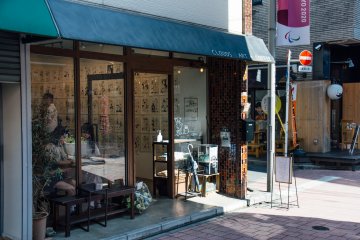
Situated a few minutes stroll from the north exit of JR Koenji Station, Clouds Art + Coffee is a simple affair reflecting the owners' passion for, well, art and coffee. Very chic and sparse, the space is compact with a fine selection of coffee from all over the world such as Ethiopia, Kenya, Colombia and Brazil which makes it the perfect spot for Tokyo's legion of coffee addicts. The owners curate a healthy mix of artwork from local and international artists and the rotational exhibition system means that regular customers have the opportunity to see, firsthand, the best and most intriguing art from Koenji's thriving art community. There's no censorship at Clouds Art + Coffee and artists are encouraged to represent themselves and their work in a free manner and this means, essentially, that customers can view an eclectic and liberating amount of art hand in hand with some of the finest coffee in Koenji and Tokyo as a whole. Clouds Art + Coffee is, ostensibly, a hub and tryst for art and coffee lovers who come from far and wide to sample international coffee made from the finest beans and art from emerging and established artists.
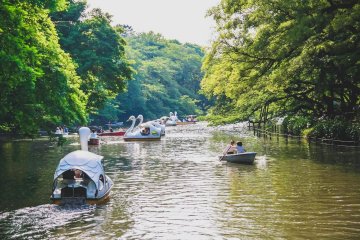
Inokashira Park is an impressive natural oasis that extends between the Musashino and Mitaka suburbs in western Tokyo. Nestled in the bustling city, this hidden gem is a popular spot among Tokyoites thanks to its lush greenery, calm vibes, and leisurely activities. The park’s sports fields and cafes also make it an ideal meeting spot. For tourists, the park is most well known for being home to the Ghibli Museum. Do not pass up the opportunity to visit this over 100-year-old expanse of greenery when exploring Tokyo.
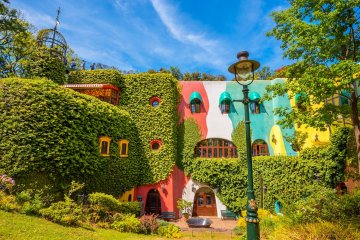
The Ghibli Museum is Japan’s must-see spot for fans of the highly acclaimed films produced by Hayao Miyazaki. Opened in 2001, the museum welcomes excited visitors to the peaceful, Ghibli-esque area of Mitaka, Tokyo. Visitor access is through reservation only, usually at least 1-3 months in advance and tickets can sell out quickly. Director Hayao Miyazaki envisioned the Ghibli Museum to be a place where everyone, not just fans of Studio Ghibli, can relax, enjoy, and discover new insights into animation. The museum’s motto: “Let’s lose our way, together”—is a slogan that perfectly conveys the spirit of the museum. Upon entering the museum, the friendly staff will trade your paper ticket for an extra special ticket—an actual cell frame from one of the Studio Ghibli films. The estate design was influenced by European architecture and is accented with symbols and landmarks from the beloved Ghibli films. Visitors are taken on a self-guided tour through Miyazaki’s creation process, through the permanent exhibits showcasing replicas of his desk, actual storyboards, and colouring cells. Special temporary exhibitions are held from time to time, usually exploring a particular theme or creative process. Be sure to visit the Saturn Theater to enjoy exclusive screenings of short animated films that are only shown at the Ghibli Museum. Although the films are not subtitled, the stories are relatively easy to follow and aren’t usually dialogue-centric. Children 12 and under can enjoy playing on a fluffy Cat Bus from “My Neighbour Totoro”. The official museum shop, Mama Aiuto!, sells original museum memorabilia and souvenirs for you to take home. The picturesque Straw Hat Cafe offers a place for visitors to enjoy snacks and desserts whilst sitting among the natural scenery of Inokashira Park. Note that photography is prohibited inside the museum but is welcome at the outdoor areas, such as the rooftop garden. Reserve your tickets early, either through your local JTB Group sales counters, online via Lawson Ticket. Entry into the museum is staggered by time to prevent the indoor exhibits from overcrowding. Closed on most Tuesdays but see the museum calendar for exceptions to this. They are also closed around the year-end as well as periodic maintenance (closed 4–18 Nov 2025).
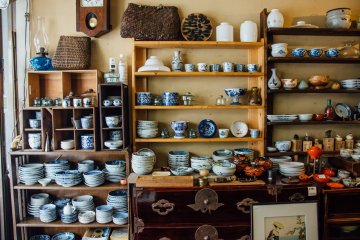
Kidoairaku is very much part of Nishi-Ogikubo’s antique community and plays a role in reflecting the wealth of antiques from Yamagata Prefecture where the owner, Takashi Watanabe, hails from. Situated a few minutes from JR Nishi-Ogikubo Station on the Chuo Line, Kidoairaku is a treasure chest of antiquities and is a charming and welcoming store in which to lose yourself. The store is compact but full of interesting antiques from a variety of historical periods including Edo, Meiji and Taisho. Kidoairaku doesn’t particularly specialize in one particular kind of antique, rather it reflects the interests and passions of the owner and loyal customers that flock there daily. Popular amongst foreign visitors are the range of beautiful ukiyo-e prints. The store also hosts a curated selection of porcelain, pottery and furniture such as sakura (cherry blossoms) designed chests of drawers. Kidoairaku is a lovely and welcoming spot which acts as an informative and attractive gateway into the thriving and bustling Nishi-Ogikubo antiques scene.